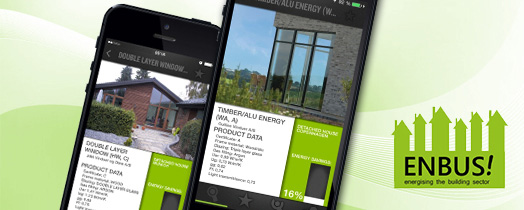
Boosting Energy Efficiency in Europe’s Building Sector

New ENBUS! smartphone app helps home owners on the way to energy efficiency
© Fraunhofer IAO
The building sector accounts for 40 percent of primary energy consumption in Europe. Home owners seeking for energy efficiency are faced with confusing and sometimes contradictory information. Now, Fraunhofer IAO has developed a smartphone app in the EU project ENBUS! that helps home owners calculate the tangible benefits of energy efficiency measures before investing.
“I’m an energy saver” – today this 1980s slogan is experiencing a revival as part of the “energy efficiency” movement. But just like back then, very few people are doing it purely for environmental reasons, since many products and solutions promise significant savings.
Energy efficiency measures are intended not only to sustainably increase a house’s value, but also to improve comfort, preserve the building’s structure and appeal visually. Above all, the measures must make sense – financially and ecologically. This requires return-on-investment figures laying on the table in advance.
To guide home owners through the information jungle surrounding energy efficiency in buildings, Fraunhofer IAO and partners from research and industry have developed an app as part of the EU project ENBUS! The app provides homeowners with a free and neutral benefit assessment of energy efficiency measures.
When planning a renovation, estimating the benefits is important but also quite difficult because the building industry and manufacturers of energy-efficient building materials and appliances promote their own offers while providing their own biased advice. Unbiased experts, on the other hand, are expensive and the process is complex. This deters many homeowners.
In the ENBUS! app users start with selecting a building type and its location. The software then models the energy savings that could be made with the wide range of products and building materials stored in the app, and delivers additional support relating to energy efficiency in buildings.
“We’re doing more than just show that energy efficiency pays off in theory,” says Dr. Thomas Fischer, project manager at Fraunhofer IAO. “We’re showing home owners how their investment translates into a concrete economic benefit.” Only then, believes Dr. Fischer, will home owners be adequately supported on the path to energy efficiency and be able to make decisions based on concrete figures measured out in euros and cents.
The ENBUS! app is currently available as a prototype for iPhone and iPad. In the future, the software will be rolled out to other platforms and the content will be comprehensively supplemented. The aim is a solution that reproduces real buildings as accurately as possible and is still easy to use. In accordance with the user’s requirements, the system can then make comprehensive proposals for energy efficient improvements based on the individual case.
Contact
Dr. Thomas Fischer
Technology Management
Fraunhofer IAO
Nobelstraße 12
70569 Stuttgart, Germany
Phone +49 711 970-2037
thomas.fischer@iao.fraunhofer.de
Weitere Informationen:
http://www.iao.fraunhofer.de/lang-en/business-areas/technology-innovation-management/1116-energy-efficiency-you-can-count-on.html
http://www.enbus.eu












